 |
|
Meet a real Dentist, Stephen Sterlitz
|
 |
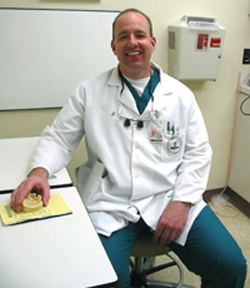
|
|
Lieutenant Stephen J. Sterlitz, D.D.S., Dentist, Comprehensive Dentistry Resident, Naval Postgraduate Dental School, United States Navy, Bethesda, Maryland
|
1. I chose this career because...
2. My typical workday involves...
3. What I like best/least about my work...
4. My career goals are...
5. When I'm not working, I like to...
6. What makes you happy?
|
|
1. I chose this career because...
|
Back to Top

|
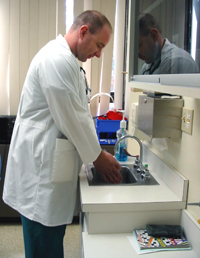
|
|
Stephen Sterlitz always washes his hands and dons clean gloves before working with a patient.
|
I chose to become a dentist because I liked what the profession represented: a constantly evolving field that provides challenges in science, mechanics, and psychology. No person or procedure is ever the same. To remain proficient, you must constantly build on your knowledge base and learn to apply it to provide the best possible service to your patients. I enjoy a challenge, and to do dentistry well, one must enjoy being a life-long student.
High School
In high school, I was the smart jock; captain of the football and basketball team and regional champion in the shot put and discus, as well as, an honor student who did well in advance placement courses. Oddly enough, I enjoyed school, specifically science and physics classes. My first aspiration was to study medicine because I didn’t know enough about dentistry to give it full consideration. In my experience and perception, doctors had a cool job, made lots of money, and people respected them. The more I saw and learned of both professions, the more my opinion changed. I never personally knew any doctors or dentists in high school, and had very limited exposure to both professions.
College
My focus on my future profession changed when the Naval Academy offered me a chance to play NCAA Division I football. Making the decision to attend the Academy and commit the next 9 years of my life was difficult for an 18-year-old kid who hadn’t ventured far from the suburbs of Detroit. In retrospect, it may have been one of the best decisions I ever made.
In college I focused more on athletics than academics and was happy to graduate from the Naval Academy with a 2.6 GPA. Although math and science were my strongest subjects, an English professor convinced me that being able to communicate effectively via the written word was going to serve me much better than being able to complete abstract equations. English majors at the Academy had to take a foreign language. I was interested in Japanese and thought it would be useful should I ever want to pursue a business career.
Naval Career
In exchange for my free education, I owed the Navy 5 years of service. I found that life as a Surface Warfare Officer is tough! I spent 3 ½ years aboard a ship and completed two 6+ month deployments – one to Somalia and the other to the Arabian Gulf. Although I was 23 years old, I knew that a career in the Navy as a Surface Warfare Officer was not for me. I started looking at a career in business, consulting, and management. Then a friend of mine informed me of the Armed Forces Health Professions Scholarship http://www.navy.com/healthcare/dentistry and I seriously considered medicine and dentistry again.
Dental School
I did not get into dental school the first time that I applied. Quite a let down for someone who had never been told “No” in his life! Even though I completed the minimum prerequisites for admission, scored in the 90th percentile on the admissions exam, and had a pretty strong resume, the dental schools wanted to see more science classes. I had to prove that I could handle the heavy academic load in dental school. Resolute to realize my goal, I resigned from active duty in the Navy and enrolled as a full-time undergraduate student at Eastern Michigan University. I took courses like Biochemistry, Anatomy, and Physiology which made my first year of dental school much more tolerable.
Education & License
- Bachelor of Science, English major/ Japanese minor, United States Naval Academy, Annapolis, Maryland
- Doctorate of Dental Surgery (DDS), University of Michigan, Ann Arbor, Michigan (Omicron Kappa Upsilon -Dental Honor Society)
- Comprehensive Dentistry Resident, Naval Postgraduate Dental School, Bethesda, Maryland (trained to deploy to isolated duty stations and provide dental care for Sailors and Marines)
- Licensed to practice in the state of Michigan (which requires continuing education to stay current in the profession)
- Member, Academy of General Dentistry, American Dental Association, Michigan Dental Association
|
|
2. My typical workday involves...
|
Back to Top

|
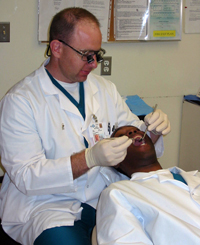
|
|
Stephen Sterlitz performs and oral exam on a patient.
|
My typical workday in the clinic involves:
- Reviewing the schedule of patients to be seen for the day
- Meeting with each patient to discuss the procedure to be done and how to avoid future dental problems
- Completing dental procedures (time varies with each procedure) and
- Giving the patients post-op or post-procedural instructions
A typical workday when I was practicing dentistry full-time varied from seeing 8-10 people who needed dental treatment to performing 25-30 patient exams a day. As a dental practitioner, I worked a 36 hour work week from 7:00 a.m. to 3:30 p.m.
As a postdoctoral student, I spend as much time in class as I do in the clinic. I may only see 20-30 patients a month. I typically work 6 days a week and need the weekend to catch-up, study, and prepare for the next week. The schedule is extremely variable and I thrive with the variety.
|
|
3. What I like best/least about my work...
|
Back to Top

|
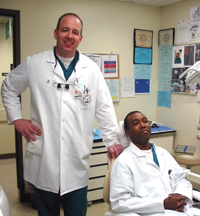
|
|
Stephen Sterlitz enjoys interacting with his patients and tries to make them feel comfortable before an exam.
|
What I like best about my work is interacting with patients, listening to their needs, and using my education and skills to help them. There is a lot of problem solving in dentistry. Although one cavity may look like another, there are always other factors to consider when deciding how to provide the best treatment for your patient. Good communication is essential to discussing the treatment and making sure the patient has realistic expectations for the services we can provide.
What I like least about my work is the administrative duties required to keep a busy practice running: reordering supplies, and documenting the patient’s dental record with the procedure and material used. All together it takes up a lot of time and, in my perception, does not greatly influence the treatment the patient receives. The hardest part of my job is dealing with the limitations of my experience and training. I want to be an expert now! It is difficult to have a patient come in with his tooth in his hand just after you restored it. There is only one person to blame, and it is up to you to figure out how to make it work.
|
|
4. My career goals are...
|
Back to Top

|

|
|
Instruments typically used for a dental exam (left to right): dental burs, mirror, cotton forceps, and perio probe.
|
My career goals are to continue to enjoy work, do the best I can, and keep all of my options open. I do not feel overly committed to a career in dentistry, nor do I feel that a career in the military is the only option for me. Life is a journey and not a destination, so I try to enjoy the ride as much as possible. My ego makes me work hard and do well so that I am considered for positions of greater responsibility and authority, but I do not have a set goal of where or what I need to be in 5-10 years. If things continue to go well in the Navy, I would like to be in Europe for 2-3 years then come back to the United States to lead the dental department on a nuclear powered aircraft carrier. Basically, I like to keep my options open and find that career and life happiness involve a state of mind, not a position or title.
|
|
5. When I'm not working, I like to...
|
Back to Top

|
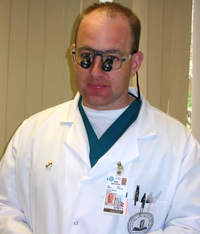
|
|
Stephen Sterlitz wears a magnifying loop as a visual aid for performing detailed work.
|
When I’m not working, I love spending time with my children, going to amusement parks, and seeing the world through their eyes. I read and play with my children. I am still busy exploring all that life has to offer, so I am not committed to any one hobby. I still play basketball. I enjoy golf. I hunt, fish and ski. Recently, I sold a 1970 convertible Cadillac that I restored. At one time, I collected old coins and baseball cards. I used to have three aquariums and really enjoy tropical fish; but all that has taken a back seat to my young family.
|
|
6. What makes you happy?
|
Back to Top

|
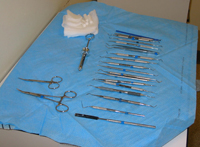
|
|
| |
Sterile instruments are arranged on a sterile pad for each patient in preparation for a dental exam.
|
Although dentistry is a great profession that has the potential to be lucrative and satisfying, it isn’t for everyone. If you enter a profession for the money, you stand a good chance to be miserable. You don’t need great hand skills or an extensive background in science (as I demonstrated being a football playing English major) but it would be good if that was where your interests were. A science background makes the art and science of dentistry an interesting challenge rather than a chore.
The best advice I can offer is to do your best and pay attention to what makes you happy. You always benefit from a well-rounded education. Everyone has the potential to achieve greatness; the challenge is discovering what you are great at!
|
|
|
|
 |